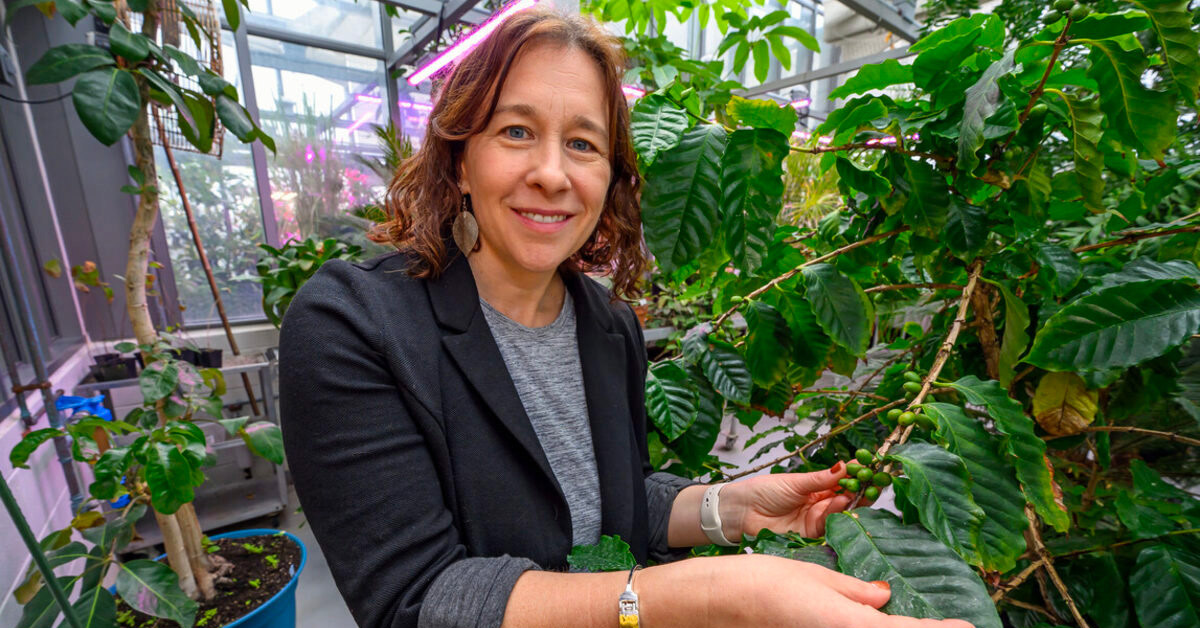Alumna plant pathologist searching for sustainable agricultural growth

Anissa Demers Poleatewich ’02 shares her career path with students
Anissa Demers Poleatewich ’02 is on a mission—to promote sustainable agriculture through environmentally friendly practices.
A scientist, educator and researcher, Poleatewich is an applied plant pathologist with experience producing a wide range of horticultural crops using a variety of crop management techniques. She specializes in pest and disease management and uses bioproducts to promote plant health and foster profitable sustainability.
“I was always really interested in seeing the impact of what I was doing,” said Poleatewich. “And for me, my world is agricultural production—for food, fiber or ornamental flowers.”
Poleatewich presented the LaDonne Heaton Schulman ’57 Alumni Lecture on Wednesday, November 20, in the Hindle Auditorium at the Diana Davis Spencer Discovery Center Dedicated to Free Speech and Innovation. The next day, she visited Professor of Biology Scott Shumway’s “Economic Botany” course and shared details about her research.
In his introduction of Poleatewich, Shumway directly addressed the students in attendance. “Anissa’s career in science has gone in a number of different places that she never would have predicted when she was sitting in your seat,” he said. “We don’t know where life is going to take you after Wheaton, but we hope to prepare you to recognize the opportunities available and seize them.”
Developing products to enhance crop growth
Poleatewich currently serves as senior manager for product development at Mycorrhizal Applications. “We research and produce mycorrhizal fungi, which are plant symbionts,” she explained. “These are fungi that associate with plants and help them take up nutrients and water and help protect them from stress.”
She collaborates with coworkers across the country—from formulation to sales and marketing, to regulatory and research and development—to find the best growing solutions for their clients. “It’s really exciting to interact with all these different people coming from very different places, all working toward the same goal.”
Taking advantage of learning opportunities
Along her career path Poleatewich gained experience in a wide range of areas due to her insatiable curiosity and thirst for knowledge. “For me, Wheaton provided a safe place to try many things and to develop an ability to not be afraid to fail,” she said. “I focused on developing myself as a whole person with a broad range of skills and a demonstrated ability to communicate, especially in writing.”
As an undergrad she completed a summer internship at the New Hampshire Department of Environmental Services, working on an air quality project that taught her a valuable lesson—she didn’t want to sit at a computer and wanted to be out in the field.
She interned the following summer at the UMass Cranberry Station in Amherst, working with a plant pathologist, which inspired her to earn an M.S. and Ph.D. in plant pathology from Penn State University.
Poleatewich served as a postdoctoral scholar at Penn State for a year and discovered that she really enjoyed teaching. She also learned about a wide variety of initiatives by assisting her classmates with their projects and receiving reciprocated help with hers. Through those projects, Poleatewich gained awareness about the production of apples, broccoli, melons and mushrooms and traveled to Bolivia, Ecuador and the Philippines.
Addressing food production and security
Her education about crop production enabled Poleatewich to formulate an opinion about making improvements to the process. “We talk about increasing populations and growing more to feed the world, but I would argue that a big part of food security is that we need to lose less,” she said.
Statistics support her view. According to ReFED, a U.S.-based nonprofit working to catalyze the food system toward evidence-based action to stop wasting food, 38% of all food produced in the U.S. goes either unsold or uneaten, and most of it goes to waste.
“We produce a lot of food, but we lose a lot to pests, diseases and food waste. At Penn State, I developed a passion for finding new solutions to lose less, but to do it in a sustainable way.”
Some pesticides are being phased out via government bans, while others are overused and can lead to pests and disease developing resistance to the treatment, she noted. Growers then need alternatives. “I was interested in finding biological controls that could be integrated to reduce the dependence on chemical pesticides, not necessarily to eliminate them,” she said.
Poleatewich’s career took her to Ontario, Canada, where she developed biocontrols for vegetables raised in hydroponic greenhouses as a research scientist in plant pathology at Vineland Research and Innovation Centre.
She then served as an assistant professor of plant pathology and plant-microbe interactions at University of New Hampshire, where she was the graduate coordinator and mentored numerous aspiring and now accomplished scientists.
“Helping others develop professionally is something that I really enjoy,” she said. “It was so rewarding when a student said to me before graduating that I was the most influential professor they had in their four years of college. That affirming comment means more to me than any professional recognition I’ve received.
“I also like the informal interactions where I can talk to growers and learn about their issues so I can better help them. By listening to what they’re doing, I can solve problems on a case-by-case basis. Those conversations help me realize that I’m doing the right thing and making an impact.”
